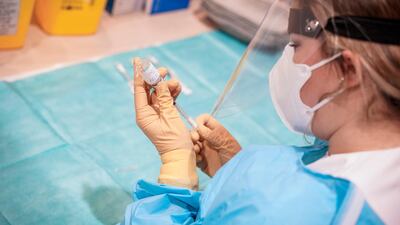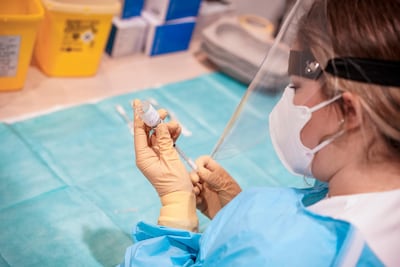Authorities in Britain have expressed concern over a low rate of vaccination take-up among healthcare workers that could hamper efforts to tackle coronavirus.
UK Health Secretary Matt Hancock said that around 80 per cent of NHS staff had been vaccinated, a rate lower than other priority groups, while a study showed signs of vaccine hesitancy among doctors and nurses at hospitals in Leicester, central England.
An A&E consultant told The National that many doctors may have been "put off" by the UK's decision to delay second doses by up to 12 weeks.
The study, which analysed more than 19,000 staff members at hospitals at Leicester NHS Trust hospitals, found that 12,278 (64.5 per cent) of all workers had received a SARS-CoV-2 vaccination. However, just 57.8 per cent of doctors and 62.5 per cent of nurses had been vaccinated.
The study supported claims of vaccine hesitancy among ethnic minority groups. Vaccination among white staff was 70.8 per cent, but lower among south Asian (58.5 per cent) and black (36.8 per cent) employees of the trust. The study said that these findings gave “significant cause for concern” as such ethnic groups were more at risk from the virus.
The government said it is concerned about the take-up of the vaccine among minority ethnic communities, and that it is working with mosques and synagogues to try to address people’s concerns.
Healthcare workers were among the first group to be offered the Pfizer-BioNTech vaccine in the UK’s inoculation campaign that began on December 12. But the study, which has not been peer-reviewed, appears to show a lower-than-expected take-up among frontline professions.
The number of vaccinations per week peaked in the week up to January 17 and has been in decline since, according to the study.
“In summary, we have found that in a population of UK healthcare workers, those from ethnic minority groups and from more deprived areas, as well as younger females and those from particular occupational groups are less likely to take up SARS-CoV-2 vaccination,” the authors of the study said.
“These findings have major implications for the effective ongoing delivery of SARS-CoV-2 vaccination programmes, both in healthcare workers and in the wider population, and should be acted upon urgently to prevent the disparities caused by the Covid-19 pandemic from being allowed to widen further.”

Mr Hancock said that the take-up by ethnic minority groups was lower compared with other groups.
“I haven’t seen that data but I do know that the take-up in the NHS is rising,” he said. “It’s around four-fifths overall but I also know that take-up among black staff and staff from other ethnic minority groups is lower.
“There’s a very important programme of work to increase that, not just among healthcare staff but across the board.”
Speaking to The National, A&E consultant Dr Mostafa Hassanein said that many doctors were waiting to see if the Pfizer-BioNTech vaccine was effective before accepting their offer.
Pfizer had initially said that there should be a three-week wait between vaccine shots. However, the UK government decided to increase the gap between first and second doses to 12 weeks to vaccinate as many people as possible.
Dr Hassanein, who has worked in Leicester hospitals for the past five years, said that this government intervention may have deterred many doctors from accepting their vaccination offer.
"Healthcare professionals are analytical by nature. They rely on facts. Unfortunately, there is not enough evidence behind delaying this second dose of the vaccine that long.
“Having said that, I received the vaccine myself. Something is better than nothing,” he said.
Social media is also thought to be affecting the overall take-up, particularly among black, Asian and minority ethnic groups.
“It would be really interesting to see similar studies run in different hospitals and compare the results,” Dr Hassanein said.
Britain has vaccinated 15 million people with a first dose and 537,715 with a second dose, a rate only surpassed by the UAE and Israel, which have smaller populations.
Mr Hancock said he expected vaccine supplies to increase as manufacturing accelerated.
On Monday, the UK launched hotel quarantine for thousands of arrivals from so-called "red list" countries. Passengers were forced to queue alongside each other for up to an hour as they passed through security checks before being taken to a quarantine hotel for 10 days.
Meanwhile, Prime Minister Boris Johnson said on Monday that he would plot a cautious but irreversible path out of the coronavirus crisis now that 15 million vulnerable people have been vaccinated.
"We've got to be very prudent and what we want to see is progress that is cautious but irreversible," Mr Johnson said. "If we possibly can, we'll be setting out dates."


